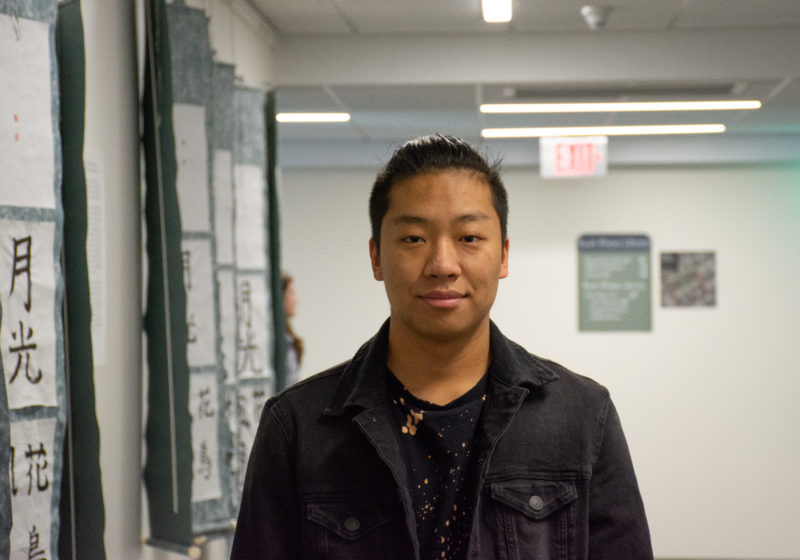A painting in the tunnels under Rush Rhees depicting three young boys urinating has sparked debate surrounding art and freedom of expression, as well as concerns about the trauma of sexual abuse.
In senior Jackson Ding’s “Self Portrait” — which has been hanging across from the Art and Music Library since early in the semester — the three young asian boys are urinating, naked except for their shirts and sandals. Standing against a pink and blue background, one boy holds a chocolate bar, another smiles at the viewer, while the third looks in a different direction.
The discussion began on a public scale on Oct. 28, when the popular anonymous Facebook page “UR Secrets & Confessions” featured a post about the painting.
“That painting in the tunnels of the naked little boys makes me so uncomfortable,” the post says. It concludes, “I think it was a bad choice to display it in such a commonly used space.” The post received 50 likes and sparked a debate in the comment section.
But for a junior woman, whose request for anonymity the Campus Times respected, the painting has more serious implications.
She told the Campus Times that she suffers from PTSD due to repeated sexual abuse throughout her childhood, and that seeing the painting every day has made her symptoms considerably worse.
The student spoke about being up at 4 a.m. every night disturbed by nightmares and flashbacks. When asked to elaborate on these flashbacks, she told of screaming, shaking, and sometimes vomiting. She described being taken out of reality, reliving her trauma: “It just feels like I’m 10 again.”
With her friends, seniors Vanessa Fan, Emily Dudek, and Angela Benson, she contacted the head of the Art and Music Library, Stephanie Frontz, who curates the exhibits each semester, to voice their concerns.
Both Frontz and Ding have said that they have no intention of taking down or moving the painting.
The junior woman, Fan, Dudek, and Benson told the Campus Times that their primary issue was with the prominent location of the painting, placing it in the field of view of commuters.
“I mean, you cannot not look at that picture,” the junior woman said. She has begun to turn her head to avoid seeing it as she walks by.
The student said that she spoke up not only on her own behalf, but for other victims of child sexual abuse on campus who may be disturbed by the painting. “I’m sure I’m not the only one.”
The commenters on the “UR Secrets & Confessions” post, who were unaware of the junior woman’s situation or complaints, expressed both discomfort and approval in reaction to the painting.
A student defending “Self Portrait” posted Ding’s label in the comments, describing his childhood in Shijiazhuang, China. “The neighborhood was our world, and the world was our playground.” Ding created the piece for his Introduction to Painting course last semester.
A more critical perspective came from graduate student Nathan Nguyen, who commented that “a painting can be inappropriate even if the artist worked hard on it and even if it reflects some meaningful childhood experiences.”
Other comments stressed the relationship between art, emotion, and freedom of expression.
“If you think art is around to make you comfortable, then think again,” junior Yoenia Krokova commented.
Ding himself weighed in in the comments, saying that his painting “displayed the freedom of my childhood.” He also thanked the commenters for their “heartfelt discussion.”
Frontz said in an interview that “the purpose of art is to elicit a reaction and to talk about why that is.”
The argument on Facebook frequently surrounded the nudity of the painting. Ding described this discomfort as cultural. “Because in a lot of cultures there’s nothing sexual about that.”
But for the junior woman, the nudity has sinister implications that go beyond cultural taboos, with the innocence depicted worsening the connotation.
“They’re saying ‘Oh, they’re so innocent. They’re so free. They don’t know they have to cover up yet.’[…] That’s what’s so painful. […] ‘Cause that’s when I got screwed over. […] When I didn’t know any better.”
Frontz told the Campus Times that “Self Portrait” will only be taken down when there is new art available, likely before Thanksgiving.
Editor’s Note (11/12/18): The article was revised to include Ding’s response in the comment section.




